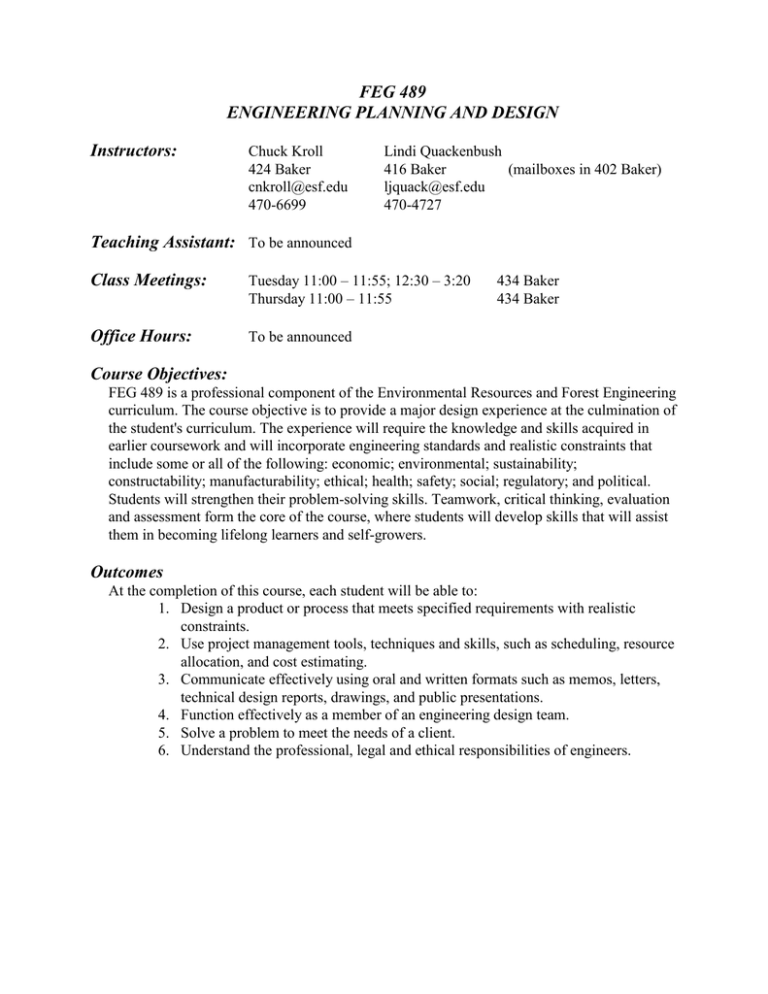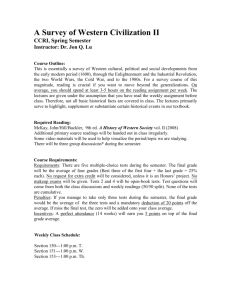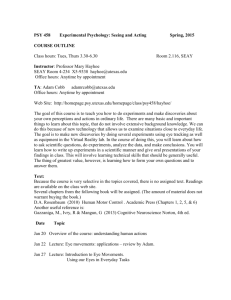FEG 489 ENGINEERING PLANNING AND DESIGN Instructors:
advertisement

FEG 489 ENGINEERING PLANNING AND DESIGN Instructors: Chuck Kroll 424 Baker cnkroll@esf.edu 470-6699 Lindi Quackenbush 416 Baker (mailboxes in 402 Baker) ljquack@esf.edu 470-4727 Teaching Assistant: To be announced Class Meetings: Tuesday 11:00 – 11:55; 12:30 – 3:20 Thursday 11:00 – 11:55 Office Hours: To be announced 434 Baker 434 Baker Course Objectives: FEG 489 is a professional component of the Environmental Resources and Forest Engineering curriculum. The course objective is to provide a major design experience at the culmination of the student's curriculum. The experience will require the knowledge and skills acquired in earlier coursework and will incorporate engineering standards and realistic constraints that include some or all of the following: economic; environmental; sustainability; constructability; manufacturability; ethical; health; safety; social; regulatory; and political. Students will strengthen their problem-solving skills. Teamwork, critical thinking, evaluation and assessment form the core of the course, where students will develop skills that will assist them in becoming lifelong learners and self-growers. Outcomes At the completion of this course, each student will be able to: 1. Design a product or process that meets specified requirements with realistic constraints. 2. Use project management tools, techniques and skills, such as scheduling, resource allocation, and cost estimating. 3. Communicate effectively using oral and written formats such as memos, letters, technical design reports, drawings, and public presentations. 4. Function effectively as a member of an engineering design team. 5. Solve a problem to meet the needs of a client. 6. Understand the professional, legal and ethical responsibilities of engineers. 2008 Project Descriptions CSO Abatement The City of Syracuse continues to suffer from problems associated with combined sewer overflows (CSOs). While many “end-of-pipe” solutions have been proposed, this design team will address ways to reduce urban stormwater runoff and problems associated with CSOs by employing advanced ecological engineering approaches. This design team requires individuals with interests and experience in the follow areas: Hydrology, Stormwater Modeling, Hydraulics, Geographic Information Systems (GIS), Landscape Architecture, and Structural Design. Urban Green Construction While numerous “green” construction design concepts have been developed for new projects, a more vexing problem is ways to apply these concepts in the renovation of older structures, especially in colder northern climates. We are looking for individuals with an interest in developing new approaches to make these buildings more energy efficient and sustainable. This design team requires individuals with interests and experience in the following areas: Structural Design, Energy Systems, Water and Wastewater Treatment, Hydraulic Systems, Architecture, Computer Aided Design (CAD). Dam Rehabilitation Throughout the United States there are dam structures in disrepair. Not only do these existing structures pose potentially dangerous situations should they fail, but often they are not constructed to most efficiently utilize available water resources. Of interest is the analysis of issues related to dam design and reconstruction. This design team requires individuals with interests and experience in the following areas: Hydrology and Water Supply Planning, GIS, Structural Engineering, Geotechnical Engineering, and Hydraulics and Hydropower Systems. Course Description Students will design a solution to one of the open-ended, complex engineering problems described above. Solutions will be found through a rigorous problem analysis and a search for and evaluation of practical alternative solutions. Students will be expected to specify a chosen alternative that meets the design criteria. Students will follow a design process, driven largely by their own initiative, which involves inquiry, deliberation, evaluation, innovation and attention to professional duty. Students will: 1. Investigate problems and synthesize information 2. Propose and test alternative solutions 3. Develop designs for critical elements of the project 4. Study, evaluate and revise designs as needed 5. Prepare and make oral presentations of the work 6. Write, edit and revise reports suitable for publication and professional presentation The course involves structured guidance, assessment and evaluation of students’ work and their progress. Students will receive guidance in the systematic application of engineering design and project management skills to solve complex, environmentally-related problems. Students are expected to record project correspondence in a logical format as part of the documentation process. While much of the assessment and evaluation is in written form, any verbal communications between instructors, consultants and students shall be recorded as part of the project documentation. This will ensure a mutual understanding has been reached. Student participation in classes and as part of a team is essential to the success in this course. Students are expected to participate in classes, field trips, investigations, guest speaker presentations, report writing, and oral presentations. Students will also maintain project management records and personal journals in addition to the usual class notes. Evaluation Evaluation is used to determine your success in meeting minimum standards of quality and performance. Your performance on a team and the quality of your proposed solution contribute greatly towards your final grade. Emphasis will be placed upon your ability to apply a design process that leads to a quality solution. Your team will be evaluated based on the systematic application of the design process, including documentation, time management, participation in team and class activities, and the quality of work that leads to a solution. The quality of solution will be judged by its robustness, including, but not limited to, the ability to satisfy client needs, the results of testing and analysis, and its ability to satisfy decision criteria established by the project team. The evaluation also includes work products such as reports, presentation and project documents. Grade distribution: Oral Presentations Mid-semester, final 20% Engineering Design Reports Basis of design, 75%, final 35% Additional Work Products Cover letter, resume, interview, reflection Ethics assignment Project Schedule Log book, notebook, meeting minutes Poster Presentation 30% Peer Evaluation and Participation 15 % Principal Work Products Oral Presentations Two oral presentations are required during the semester: a mid-semester report in the week before spring break and a final oral presentation in the last week of the semester. These oral presentations will be made before an audience of peers, faculty and professional colleagues. Evaluation criteria will consider the delivery and quality of the presentation. Practice before the instructor will be required in preparation for the final oral presentation. Engineering Design Reports The Engineering Design Report will be submitted in three stages: the Basis of Design Report, a 75% Report, and a Final Report. The instructors will evaluate the written reports for conformance with the guidelines and specifications provided in class. The documentation of the design process, calculations and graphics will form a significant portion of the evaluation. The final report is the last opportunity to demonstrate the quality of the design process followed and the robustness of the proposed solution. The problem solution will be evaluated against the criteria developed by the team. The robustness of the solution and adherence to the definition of a high quality solution will be the primary focus of the evaluation. Additional Work Products Cover letter, resume, interview, reflection Each student is required to submit a cover letter and resume in order to participate in the initial interview process. Feedback on the materials submitted and the interview will allow the student to produce an introspective, reflecting on areas for future improvement. Ethics/Sustainability Assignment Issues of engineering ethics and sustainability are paramount for successful professional practice. You will be exposed to corporate and individual ethical issues, how these impact practicing engineers, and how sustainability can be integrated into the engineering design process. This assignment will allow you to reflect on the topics presented in class. Project Schedule Each design team will employ project management techniques to develop a project schedule. This schedule will outline the tasks needed to complete the design project, the interconnections between these tasks, and the critical path to complete the project by the end of the semester. This exercise will allow project teams to assess their progress and redistribute their efforts where needed. Project Management Notebook and Meeting Minutes Each team is required to keep a project management notebook charting progress and decisions throughout the semester. The team will be evaluated on its ability to document the project completely and accurately. The project management notebook will contain at a minimum: time records; schedule; meeting minutes; team reflections (self-assessment); scope of work; communications; team contact information; and change orders. Every individual will contribute to the notebook, including keeping meeting minutes. Regular assessment of the notebook by the instructors will guide both team and individual success and growth. Engineering Log Book Each individual is required to keep a complete and current journal, separate from the team notebook, that records assignments, notes, and "to do" lists. The journal will document the project and provide a mechanism for self-assessments that reflect on the individual’s learning experiences throughout the semester. Poster Presentation Poster presentations are a common method to communicate with a broader audience in an informal setting. Each team will prepare a poster to communicate graphically the final design project. The posters will be displayed during the final oral presentations and potentially at other locations on campus. Peer Evaluation and Participation Each team member will provide an evaluation of their teammates’ contributions at two points in the semester. Evaluation guidelines will be provided in class. Student progress and participation will be evaluated regularly throughout the semester. Key tools for assessment include instructor’s assessment of student performance during structured class activities; Engineering Log Book; and peer assessments. Assessments will be real-time (occurring during the execution of an activity), formative, or summative (occurring at the conclusion of an activity). Self-assessment (individual student responsibility for selfassessing performance) will be integral to successful completion of the course. The instructors’ evaluation of these assessments will consider completeness, participation, and evidence of growth during the semester. Academic Integrity Academic dishonesty is unacceptable evidence of character and will be dealt with severely. Any acts of plagiarism, cheating, etc. will result in a grade of zero for the work submitted, as well as other possible academic actions. Sources of Support and Class Absence If you experience academic or personal difficulties that affect your studies or life, there are many sources of support on campus. There is a website that serves to answer many student questions: http://www.esf.edu/students/success. In addition, the ESF Office of Student Life, 110 Bray Hall (470-6660) will provide academic support, career guidance, personal counseling, or direct you to the proper source of help. If you encounter a situation beyond your control in which you will be missing two or more days of classes, you can contact the Office of Student Life and they will contact all your instructors for you. Supportive documentation may be required. Accommodations for Students with Disabilities If you have an identified disability and will need accommodations, you should contact the Office of Student Life in 110 Bray Hall. Staff in this office will discuss the ESF process and work with you to access supportive services. If you have a learning disability, the College requires you to provide supportive documentation and will develop an approved accommodation sheet for you. Accommodations cannot be provided until the accommodation sheet is established and we meet to discuss its applicability to this course. Accommodations cannot be established retroactively. FEG 489 Tentative Schedule of Activities 2008 Week 1 15 Jan 2 17 Jan 22 Jan 3 24 Jan 29 Jan 4 31 Jan 5 Feb 5 7 Feb 12 Feb 6 14 Feb 19 Feb 7 21 Feb 26 Feb 8 28 Feb 4 Mar 9 10 6 Mar 9/11 Mar 18 Mar 11 20 Mar 25 Mar 12 27 Mar 1 Apr 13 3 Apr 8 Apr 14 10 Apr 15 Apr 15 17 Apr 22 Apr 16 24 Apr 29 Apr Session 11:00 – 11:55 12:30 – 3:20 11:00 – 11:55 11:00 – 11:55 12:30 – 3:20 11:00 – 11:55 11:00 – 11:55 12:30 – 3:20 11:00 – 11:55 11:00 – 11:55 12:30 – 3:20 11:00 – 11:55 11:00 – 11:55 12:30 – 3:20 11:00 – 11:55 11:00 – 11:55 12:30 – 3:20 11:00 – 11:55 11:00 – 11:55 12:30 – 3:20 11:00 – 11:55 11:00 – 11:55 12:30 – 3:20 11:00 – 11:55 11:00 – 11:55 12:30 – 3:20 11:00 – 11:55 11:00 – 11:55 12:30 – 3:20 11:00 – 11:55 11:00 – 11:55 12:30 – 3:20 11:00 – 11:55 11:00 – 11:55 12:30 – 3:20 11:00 – 11:55 11:00 – 11:55 12:30 – 3:20 11:00 – 11:55 11:00 – 11:55 12:30 – 3:20 11:00 – 11:55 11:00 – 11:55 12:30 – 3:20 Topics Course Introduction Interviews Interview recap/project assignments/data delivery Project site visit preparation Work period: Project site visit/project planning Communication: log books, memos, letters, minutes Communication: client contact/site visit preparation Work period: Project site visit/project planning planning Design process/scope of work/brainstorming Project management and scheduling Work period: Developing a project schedule/Ethics Ethics and Sustainability Ethics and Sustainability Work period: Revising scope of work and schedule Communication: written reports Basis of Design Report (BODR) Work period: Preliminary solutions/design criteria Engineering profession: professional societies/tools Communication: oral reports Work period: Preliminary solutions/design criteria Work period Work period Mid-semester oral presentation: conceptual solution Work period SPRING BREAK Review BODR and design criteria Work period: Revise project design/schedule Work period Cost estimating and economic analysis Work period: Cost estimating Work period Solution analysis: application of design criteria Work period: Client meeting/progress report Work period Communication: graphical presentations Work period: Poster preparation Work period Work period Work period: Practice presentations Work period Work period Oral presentations Work period Work period Work period Submissions Reflection (individual) Initial scope of work (team) Project schedule (team) Ethics assignment (indiv.) Revised scope of work (team) Log book review (individual) Peer/self assessment (indiv.) BODR (team) 75% progress report (team) Poster (team) Final report (team) Peer/self assessment (indiv.)







